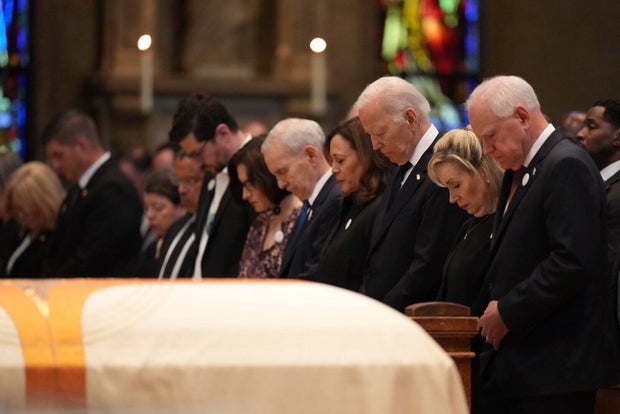Hundreds gathered Saturday morning at Minneapolis’ Basilica of St. Mary for the private funeral of Democratic Minnesota House Speaker Emerita Melissa Hortman, her husband Mark and their dog, Gilbert.
Gov. Tim Walz and Robin Ann Williams, a close friend of the Hortmans, spoke at the service, which was a traditional Catholic Mass said by Father Dan Griffith. Walz also served as a pallbearer.
“Melissa Hortman will be remembered as the most consequential speaker in Minnesota history – and I’ll always remember her as a close friend, a mentor, and the most talented legislator I’ve ever known,” Walz said in his eulogy. “For seven years, I’ve had the privilege of signing her bills into law. And I know that millions of Minnesotans will get to live better lives because she and Mark chose public service.”
Melissa Hortman was remembered for her leadership, sense of humor and strong commitment to doing good work to improve the lives of Minnesotans.
“Her mission was to get as much good done for as many people as possible,” Walz said. “That focus on people is what made Melissa so effective. She knew how to get her way, no doubt about it. But she never made anyone feel like they’d gotten rolled at the negotiating table.”
Mark Hortman shared his wife’s passion for helping others, Walz said, the two having met at a mentorship event in Washington, D.C., more than 30 years ago.
“…There’s a part of the story that belongs only to those of us fortunate enough to know the people behind that legacy,” Walz said. “It takes place at CR’s Billiards, where Mark loved to shoot pool on Monday nights. It takes place in the garden, where Melissa fussed over her lilies like they were wayward members of the caucus. It takes place in the kitchen, where Mark fed his sourdough starter and Melissa mixed margaritas and baked cakes and Gilbert begged for scraps and the sound of laughter filled the air.”
The governor encouraged people to learn from the way the Hortmans lived to honor their legacy.
“Maybe this is a moment when each of us can examine the way we work together, the way we talk about each other, the way we fight for the things we care about. A moment when each of us can recommit to engaging in politics and life the way Mark and Melissa did – fiercely, enthusiastically, heartily, but without ever losing sight of our common humanity,” Walz said. “But let’s not do it because of the way Mark and Melissa died. Let’s do it because of the way they lived, and the way they led. With joy and passion. With respect and empathy. With purpose and humility.”
Stephen Maturen / Getty Images
Griffith said the Hortmans would regularly open their Brooklyn Park home to guests, adding they referred to it as the “Hortman Hotel.”
“Everyone was welcome,” Griffith said. “I can’t believe how Melissa and Mark lived community with that degree of intentionality. It’s a beautiful thing.”
In her eulogy, Williams added that the evenings Mark and Melissa Hortman spent with their friends “held a sacrosanct position” on their calendars.
“We are buried in sorrow right now, but I do believe that we will experience joy again. And Mark and Melissa would not want it any other way,” she said.
Colin Hortman, the son of Mark of Melissa, gave the prayer alongside his fiancée. He recited the Prayer of St. Francis, a copy of which he says Melissa Hortman kept in her wallet.
Among attendees were former President Joe Biden and Vice President Kamala Harris, who were invited to the funeral by Walz on behalf of the Hortmans’ children.
Alex Kormann / AP
Sen. Amy Klobuchar was unable to attend the Hortmans’ funeral in person, but praised their leadership.
“They met as volunteers working to help kids, and that dedication to serving others never wavered,” Klobuchar said in a statement.. “Sophie and Colin said that the best way to honor their parents is ‘to do something, whether big or small, to make our community just a little better for someone else.’ I can think of no better way to honor Melissa and Mark.”
In the days following their deaths, the Hortman children, in a statement remembering their parents, encouraged people to honor their memory with a list of actions, including baking, petting a dog and planting a tree.
Hortmans lie in state
The funeral comes one day after the Hortmans and their dog laid in state in the Minnesota Capitol Rotunda. Melissa Hortman is the first woman to ever have the honor.
Walz was among the first mourners to visit the rotunda on Friday. Later Friday afternoon, former President Joe Biden arrived at the State Capitol rotunda to pay tribute.
People began arriving before 10 a.m. Friday, standing on the Capitol steps to make sure they were in place for their chance to pay tribute to the lawmaker many say perfected the art of compromise — working with colleagues on both sides of the aisle to do what she thought was best for all Minnesotans.
“It’s an honor to be here,” said Julie Johnson, of Rochester. “Melissa was just such a giving, selfless servant for everybody.”
Stephen Maturen / Getty Images
Some came with flowers. Others wore their hearts on their sleeves, devastated by the loss of the people’s lawmaker who worked for decades to make the lives of all Minnesotans better.
Minnesota Department of Public Safety Assistant Commissioner John Cunningham said 7,500 people paid respects at the Capitol rotunda on Friday.
Melissa Hortman served in the Minnesota House for 11 terms, representing District 34B, after being elected to the legislature in 2004. She also spent several years in the role of House Speaker.
Melissa Hortman and her husband leave behind two children.
Since her killing, many have been praising her leadership. On Thursday, U.S. House Majority Whip Tom Emmer, R-Delano, honored her on the House floor as a bridge builder.
“As speaker of the Minnesota House, she led with integrity and fostered bipartisan collaboration, even during the most challenging times in our state,” Emmer said.
Until Melissa Hortman was killed, the Minnesota state House was evenly divided 67-67. In the state Senate, Democrats hold a one-seat majority.
“Melissa Hortman represented the best of Minnesota,” DFL party chair Richard Carlbom said in a statement. “She was a tireless, devoted public servant who deeply loved our state and devoted her life to making it a better place. The warmth and kindness she showed to her family and friends were matched only by her fierce commitment to improving the lives of those she had never even met.”
The Hortmans’ suspected killer
Vance Boelter, 57, is accused of killing the Hortmans and their dog inside their Brooklyn Park home in the early morning hours of June 14. He was arrested near his Sibley County home some 36 hours after the shootings. Officials say it was the largest manhunt in Minnesota history.
About 90 minutes before the Hortmans were killed, Boelter is accused of going to the Champlin home of Democratic state Sen. John Hoffman and shooting him nine times. His wife, Yvette, was shot eight times. The Hoffmans are still recovering. The former President also paid a visit to the Hoffmans on Friday.
Boelter appeared in St. Paul’s federal courthouse late Friday morning, his second court appearance since being charged by the U.S. Attorney’s Office with two counts of murder, two counts of stalking and two weapons charges.
Boelter may face the death penalty if convicted. He is also expected to have a state trial, where he faces the possibility of life without parole.
WCCO will re-air the funeral in its entirety at 7 p.m. Saturday on its free streaming service, CBS News Minnesota.
Derek James and
Caroline Cummings
contributed to this report.





